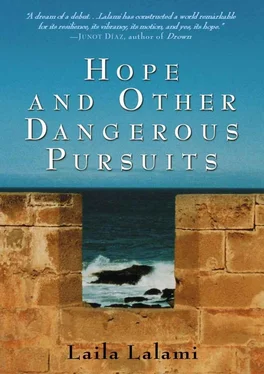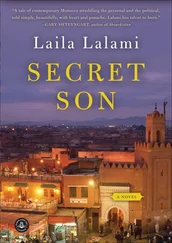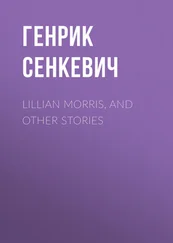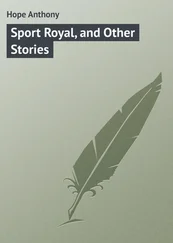Laila Lalami
Hope and Other Dangerous Pursuits
FOURTEEN KILOMETERS. Murad has pondered that number hundreds of times in the last year, trying to decide whether the risk was worth it. Some days he told himself that the distance was nothing, a brief inconvenience, that the crossing would take as little as thirty minutes if the weather was good. He spent hours thinking about what he would do once he was on the other side, imagining the job, the car, the house. Other days he could think only about the coast guards, the ice-cold water, the money he’d have to borrow, and he wondered how fourteen kilometers could separate not just two countries but two universes.
Tonight the sea appears calm, with only a slight wind now and then. The captain has ordered all the lights turned off, but with the moon up and the sky clear, Murad can still see around him. The six-meter Zodiac inflatable is meant to accommodate eight people. Thirty huddle in it now, men, women, and children, all with the anxious look of those whose destinies are in the hands of others — the captain, the coast guards, God.
Murad has three layers on: undershirt, turtleneck, and jacket; below, a pair of thermal underwear, jeans, and sneakers. With only three hours’ notice, he didn’t have time to get waterproof pants. He touches a button on his watch, a Rolex knockoff he bought from a street vendor in Tangier, and the display lights up: 3:15 A.M. He scratches at the residue the metal bracelet leaves on his wrist, then pulls his sleeve down to cover the timepiece. Looking around him, he can’t help but wonder how much Captain Rahal and his gang stand to make. If the other passengers paid as much as Murad did, the take is almost 600,000 dirhams, enough for an apartment or a small house in a Moroccan beach town like Asilah or Cabo Negro.
He looks at the Spanish coastline, closer with every breath. The waves are inky black, except for hints of foam here and there, glistening white under the moon, like tombstones in a dark cemetery. Murad can make out the town where they’re headed. Tarifa. The mainland point of the Moorish invasion in 711. Murad used to regale tourists with anecdotes about how Tariq Ibn Ziyad had led a powerful Moor army across the Straits and, upon landing in Gibraltar, ordered all the boats burned. He’d told his soldiers that they could march forth and defeat the enemy or turn back and die a coward’s death. The men had followed their general, toppled the Visigoths, and established an empire that ruled over Spain for more than seven hundred years. Little did they know that we’d be back, Murad thinks. Only instead of a fleet, here we are in an inflatable boat — not just Moors, but a motley mix of people from the ex-colonies, without guns or armor, without a charismatic leader.
It’s worth it, though, Murad tells himself. Some time on this flimsy boat and then a job. It will be hard at first. He’ll work in the fields like everyone else, but he’ll look for something better. He isn’t like the others — he has a plan. He doesn’t want to break his back for the spagnol , spend the rest of his life picking their oranges and tomatoes. He’ll find a real job, where he can use his training. He has a degree in English and, in addition, he speaks Spanish fluently, unlike some of the harraga.
His leg goes numb. He moves his ankle around. To his left, the girl (he thinks her name is Faten) shifts slightly, so that her thigh no longer presses against his. She looks eighteen, nineteen maybe. “My leg was asleep,” he whispers. Faten nods to acknowledge him but doesn’t look at him. She pulls her black cardigan tight around her chest and stares down at her shoes. He doesn’t understand why she’s wearing a hijab scarf on her hair for a trip like this. Does she imagine she can walk down the street in Tarifa in a headscarf without attracting attention? She’ll get caught, he thinks.
Back on the beach, while they all were waiting for Rahal to get ready, Faten sat alone, away from everyone else, as though she were sulking. She was the last one to climb into the boat, and Murad had to move to make room for her. He couldn’t understand her reluctance. It didn’t seem possible to him that she would have paid so much money and not been eager to leave when the moment came.
Across from Murad is Aziz. He’s tall and lanky and he sits hunched over to fit in the narrow space allotted to him. This is his second attempt at crossing the Strait of Gibraltar. He told Murad that he’d haggled with Rahal over the price of the trip, argued that, as a repeat customer, he should get a deal. Murad tried to bargain, too, but in the end he still had to borrow almost 20,000 dirhams from one of his uncles, and the loan is on his mind again. He’ll pay his uncle back as soon as he can get a job.
Aziz asks for a sip of water. Murad hands over his bottle of Sidi Harazem and watches him take a swig. When he gets the bottle back, he offers the last bit to Faten, but she shakes her head. Murad was told he should keep his body hydrated, so he’s been drinking water all day. He feels a sudden urge to urinate and leans forward to contain it.
Next to Aziz is a middle-aged man with greasy hair and a large scar across his cheek, like Al Pacino in Scarface. He wears jeans and a short-sleeved shirt. Murad heard him tell someone that he was a tennis instructor. His arms are muscular, his biceps bulging, but the energy he exudes is rough, like that of a man used to trouble with the law. Murad notices that Scarface has been staring at the little girl sitting next to him. She seems to be about ten years old, but the expression on her face is that of an older child. Her eyes, shiny under the moonlight, take up most of her face. Scarface asks her name. “Mouna,” she says. He reaches into his pocket and offers her chewing gum, but the girl quickly shakes her head.
Her mother, Halima, asked Murad the time before they got on the boat, as though she had a schedule to keep. She gives Scarface a dark, forbidding look, wraps one arm around her daughter and the other around her two boys, seated to her right. Halima’s gaze is direct, not shifty like Faten’s. She has an aura of quiet determination about her, and it stirs feelings of respect in Murad, even though he thinks her irresponsible, or at the very least foolish, for risking her children’s lives on a trip like this.
On Aziz’s right is a slender African woman, her corn-rows tied in a loose ponytail. While they were waiting on the beach to depart, she peeled an orange and offered Murad half. She said she was Guinean. She cradles her body with her arms and rocks gently back and forth. Rahal barks at her to stop. She looks up, tries to stay immobile, and then throws up on Faten’s boots. Faten cries out at the sight of her sullied shoes.
“Shut up,” Rahal snaps.
The Guinean woman whispers an apology in French. Faten waves her hand, says that it’s okay, says she understands. Soon the little boat reeks of vomit. Murad tucks his nose inside his turtleneck. It smells of soap and mint and it keeps out the stench, but within minutes the putrid smell penetrates the shield anyway. Now Halima sits up and exhales loudly, her children still huddling next to her. Rahal glares at her, tells her to hunch down to keep the boat balanced.
“Leave her alone,” Murad says.
Halima turns to him and smiles for the first time. He wonders what her plans are, whether she’s meeting a husband or a brother there or if she’ll end up cleaning houses or working in the fields. He thinks about some of the illegals who, instead of going on a boat, try to sneak in on vegetable trucks headed from Morocco to Spain. Last year the Guardia Civil intercepted a tomato truck in Algeciras and found the bodies of three illegals, dead from asphyxiation, lying on the crates. At least on a boat there is no chance of that happening. He tries to think of something else, something to chase away the memory of the picture he saw in the paper.
Читать дальше












